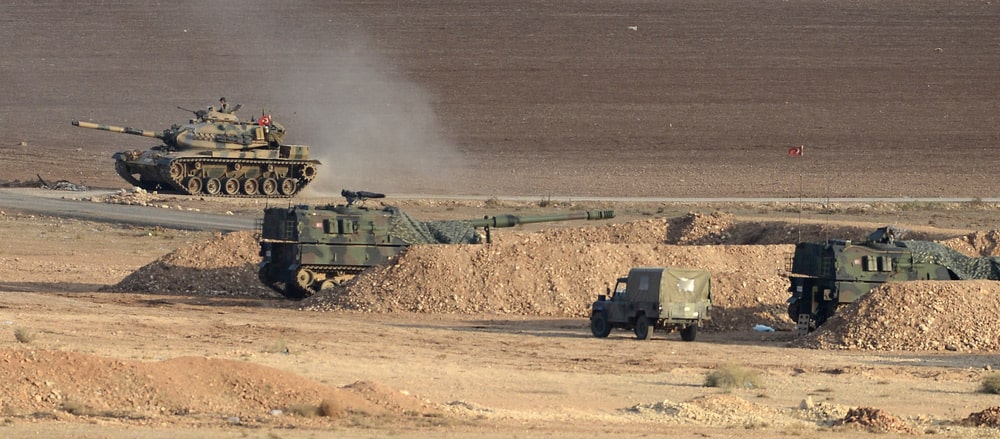The International Bar Association’s Human Rights Institute (IBAHRI) strongly condemns the recent assaults against Syrian Kurds by Turkish forces in northern Syria, and calls on Turkey to halt the attacks.
Although Turkey has not ratified any of the additional protocols to the 1949 Geneva Convention, prohibitions of attacks on civilians are a norm of customary international law. Customary international humanitarian law provides that attacks must not be directed against civilians.

Turkey is also bound by the International Covenant on Civil and Political Rights (ICCPR), ratified in 2003, and the European Convention for the Protection of Human Rights and Fundamental Freedoms (ECHR), ratified in 1954, which oblige Turkey to respect the right to life guaranteed to all individuals under their control, even when in Syria. Both the ICCPR and ECHR provide that if, through its agents, a state exercises control or authority over an individual, the controlling state has an obligation to secure that individual’s rights. In addition, the Constitution of the Republic of Turkey also guarantees the right to life (Article 17), and the suspension of fundamental rights for war does not apply to the right to life (Article 15).
Baroness Helena Kennedy QC, IBAHRI Director, stated, ‘We are extremely concerned about the recent military operations in northern Syria. The Turkish invasion has exacerbated the ongoing humanitarian crisis in the country.’ She added, ‘Furthermore, Turkey has an obligation under international law to distinguish between combatants and civilians, and to ensure that civilians are not made the object of attack.’
Following a phone call between United States President Donald Trump and Turkish President Tayyip Erdogan on 6 October 2019, the US removed its troops from the Turkish–Syrian border. Three days later, Turkish forces along with Turkish-backed Syrian Arab militias began an offensive into northern Syria, an area that is primarily inhabited by Syrian Kurds. Turkey considers the Syrian Kurdish fighters – forces that were US allies in the fight against the self-titled Islamic State (IS) – to be terrorists that must be eradicated.
Reports have stated that Turkish-backed militias have summarily executed nine civilians, including a female politician. The targeting of civilians not taking part in hostilities and civilian objects is a violation of the Geneva Convention and a war crime. The offensive by Turkey could also allow for a resurgence of IS as thousands of IS fighters are currently detained in the Kurdish-held territory. The invasion by Turkey could unintentionally lead to the release of IS members and have other unintentional consequences.
Thus far, the Turkish bombardment and invasion of northern Syria has resulted in many civilian casualties and has displaced at least 160,000 people, according to a statement attributed to the spokesman of the United Nations Secretary-General. There have also been reports of damage to hospitals according to Doctors Without Borders – the independent, global movement providing medical aid where it is needed most – as well as damage to critical water infrastructure.
ENDS
Notes to the Editor
- The International Bar Association (IBA), the global voice of the legal profession, is the foremost organisation for international legal practitioners, bar associations and law societies. Established in 1947, shortly after the creation of the United Nations, it was born out of the conviction that an organisation made up of the world's bar associations could contribute to global stability and peace through the administration of justice. The International Bar Association’s Human Rights Institute (IBAHRI), an autonomous and financially independent entity, works to promote, protect and enforce human rights under a just rule of law, and to preserve the independence of the judiciary and the legal profession worldwide.
- The Statement attributable to the Spokesman for the Secretary-General – on Syria from 14 October 2019 provides that at least 160,000 civilians have been displaced. It further addresses the concerns around the unintended release of IS prisoners as a consequence of the military operations.
- The Principle of Distinction between Civilians and Combatants is a norm of customary international law applicable in both international and non-international conflicts. It requires that fighters distinguish between combatants who can be valid military targets and civilians who are not. Civilians will not lose their protection from attack unless they take direct part in hostilities. International humanitarian law also prevents attacks on person who are considered hors de combat. This includes the killing of those detained by an adverse party.
For further information please contact: